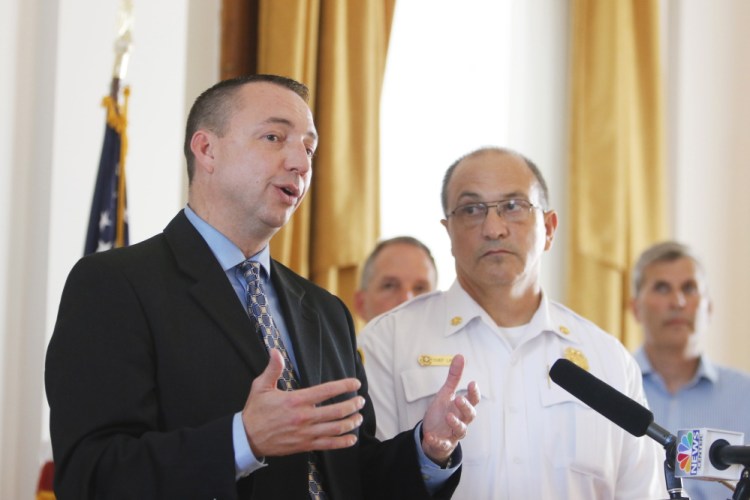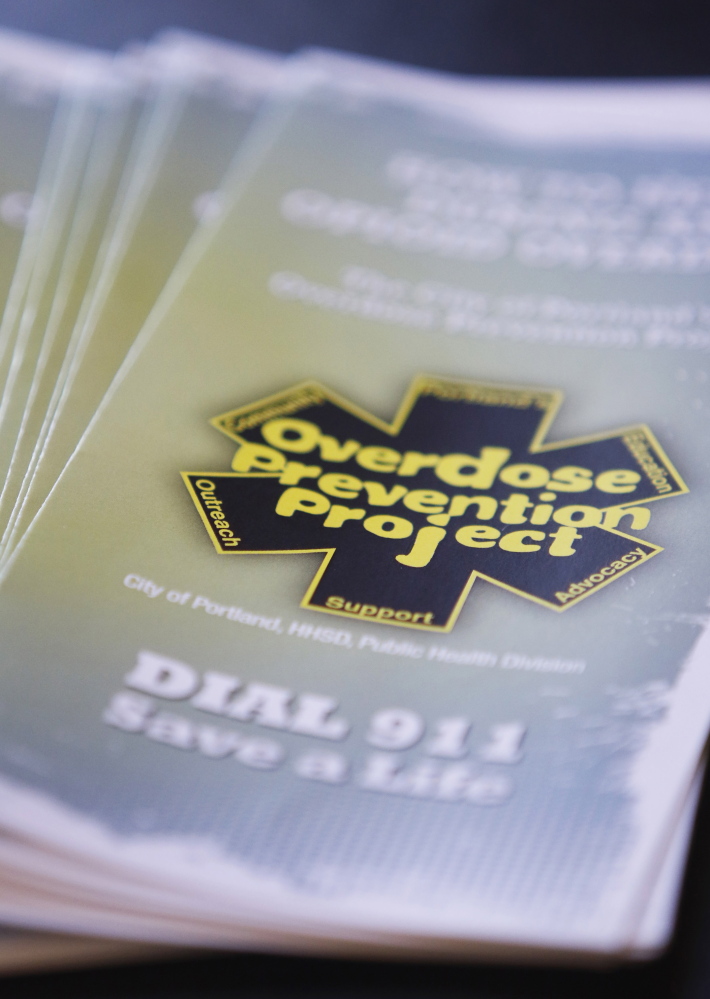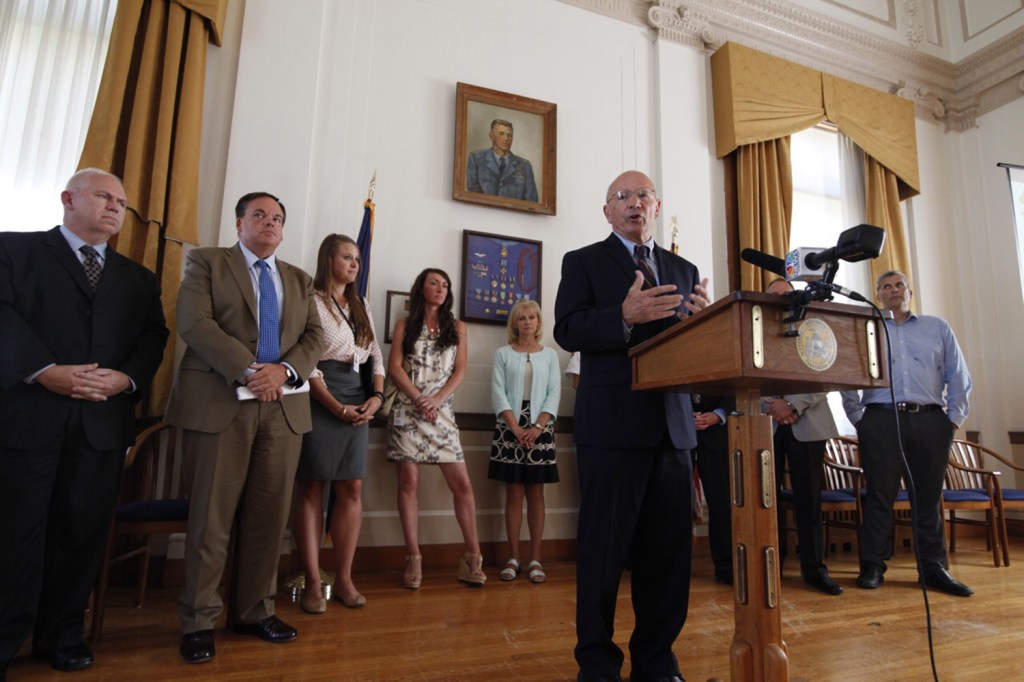An alarming spike in heroin overdoses in Portland last week is prompting broader discussion about actions needed to address the state’s growing problem and about the lack of treatment options available to opiate addicts trying to get clean.
On Wednesday, Portland officials detailed a new public awareness campaign – including public service announcements and an overdose education website – less than a week after the city’s emergency medical services responded to 14 overdoses in a 24-hour period. Two of the 14 overdose victims died.
City officials discussed plans to seek funding for a pilot program that encourages police to help connect low-level drug offenders with treatment or social services rather than sending them to jail. Police also have stepped up foot and vehicle patrols in areas where discarded needles have been found. But they also called for more state support and a greater focus on treatment to combat an epidemic affecting every neighborhood in the city as well as communities throughout the state.
“With this recent spike, we are taking immediate actions (on factors) that we as a city have control over,” Portland City Manager Jon Jennings said during a City Hall news conference. “But I want to be clear again: The rising opiate use and addiction is not unique to Portland or to Maine. It is happening all across our country.”
‘NOT ENOUGH’ TREATMENT SERVICES
The 14 overdoses occurred between 8 a.m. Friday and 8 a.m. Saturday, up from the five or six overdoses that Portland emergency medical services crews would typically see in a 24-hour period. The spike coincides with a national surge in heroin use, fueled by the low cost of the street drug at a time when prescription opiate painkillers are becoming harder to find and more expensive to buy. Many users become addicted to painkillers first, then turn to heroin to feed their addictions and avoid going into withdrawal.
Roughly two hours after Portland city officials spoke, Gov. Paul LePage announced plans for a summit later this month to address what the administration calls “Maine’s drug crisis.” LePage also once again accused state lawmakers of a “lack of commitment” to addressing the drug problem because they only funded four of the 14 additional drug enforcement agents requested in his budget.
“Now it’s time to dedicate the adequate resources we need to fund the law enforcement side of the problem,” LePage wrote in a letter to legislative leaders. “I will be convening a group of top officials from state, local and federal law enforcement agencies to discuss what resources we need, where they need to be deployed and how to get them into action immediately.”
LePage’s focus on law enforcement contrasts with what Portland city officials and substance abuse professionals say is needed to address the growing opiate problem.
Portland Police Chief Michael Sauschuck said addressing substance abuse takes a three-legged approach focused on prevention, rehabilitation and law enforcement. Focusing on just one area, such as law enforcement, leads to failure, Sauschuck said.
Asked about addiction treatment services, Sauschuck responded: “There is not enough. In the city of Portland and in the nation, there is not enough.”
One approach that Portland officials are considering is replicating a program used in Seattle to attempt to break the cycle in which drug abusers are arrested, prosecuted and incarcerated only to resume drug use after release. Instead, a program called Law Enforcement Assisted Diversion, or LEAD, aims to divert those arrested for low-level drug crimes toward community-based treatment and other support programs.
Portland Mayor Michael Brennan said the city is looking to public and private sources for the estimated $100,000 to $200,000 needed to start a pilot LEAD program.
“LEAD is unique and different because it focuses on substance abuse intervention rather than criminal justice intervention,” Brennan said.
‘VERY DESPERATE PEOPLE’
Heroin abuse and overdose rates are up sharply nationwide. In Maine, the number of people who died from heroin jumped from seven in 2011 to 28 in 2012, then to 34 in 2013 and 57 in 2014, according to statistics from the Chief Medical Examiner’s Office. Also, the number of overdose deaths involving fentanyl – a powerful opiate prescription drug often combined with heroin or sold as straight heroin to unsuspecting buyers – grew from 9 to 43 in the same span.
Fentanyl has emerged as a prime concern because it is up to 40 times stronger than heroin and increases the risk of potentially fatal overdoses when it is mixed with heroin to amplify the drug’s effects.
Substance abuse providers say there already were lengthy waiting lists for treatment services when Mercy Hospital announced plans this spring to close its Westbrook substance abuse recovery center, citing lower reimbursement rates and fewer patients being covered by MaineCare, the state’s version of Medicaid. The hospital said the program had been losing money for years.
Mercy said at the time that some of the roughly 250 patients would be transferred to the system’s Portland facility. On Wednesday, a Mercy spokeswoman wasn’t able to provide an update on how many patients had been transferred to Portland.
The closure compounded pressure on Portland’s only in-patient detoxification program run by the Milestone Foundation. Bob Fowler, Milestone’s executive director, said his staff members are forced to turn away people seeking one of the facility’s 16 beds. Some people call several times a day hoping to grab an open bed.
“Our phones have been ringing just off the hook,” Fowler said. “I hear from staff who are very discouraged by the calls they are receiving from very desperate people, and they have very little to offer them.”
Milestone’s statistics speak to the surging opiate addiction problem in Maine and nationwide. In January 2009, opiate addicts accounted for just 4.7 percent of Milestone’s detoxification admissions. As of this May, those seeking treatment for heroin or opiate addictions accounted for 46 percent of admissions.
‘IT’S GOING TO GET A LOT WORSE’
Steve Cotreau, program manager at the Portland Recovery Community Center, a gathering place and support center for addicts, said he knew one of the two people who died during last weekend’s surge of overdoses. Cotreau spent most of Wednesday trying unsuccessfully to help a younger addict who came into the center suffering from withdrawal find a placement in a local treatment program.
Like Fowler, Cotreau painted a picture of desperation both among addicts and those working to help them.
“It’s devastating,” Cotreau said of the Mercy closure. “It is one more piece of the pie that is gone, and it wasn’t a big pie to begin with. We have this very challenging and deadly epidemic and no resources to help. And it is going to get worse. It’s going to get a lot worse.”
As part of Portland’s public awareness campaign, city officials have begun urging citizens to contact the city to dispose of discarded needles found on city-owned property. They also are seeking to increase awareness about a city-run needle exchange program that provides free, clean hypodermic needles to addicts turning in used needles, in an effort to reduce the risk of transmission of HIV, hepatitis C and other blood-borne diseases.
“What they do every single day is saving lives, and this is something that Portland and the community needs to know,” Jennings said.
Anyone who finds a discarded needle on city-owned property is urged to call the public works department at 874-8493, which will arrange for proper disposal of the needle.
Send questions/comments to the editors.





